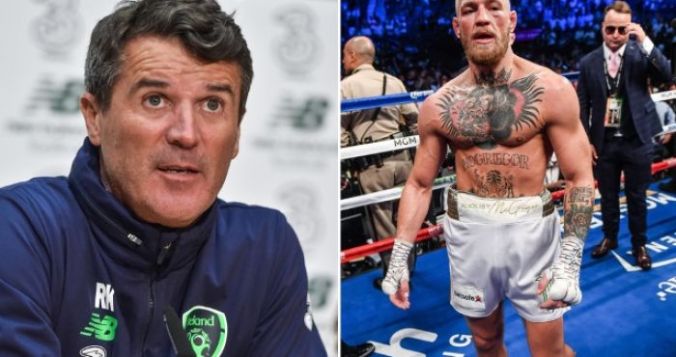This article is an excerpt from Episode 2 of The Evangelical Seanchaí Podcast – which will go live on Monday morning 9th September. The podcasts are now accessible on iTunes
The Evangelical Seanchaí on iTunes
Looking over the news stories of the last seven days, I’m reminded of that line from the hymn, Abide with Me – “Change and decay in all around I see,” The Amazon rainforest is still burning. The Bahamas have been swamped by a devastating hurricane. The British parliamentary system seems to be falling apart. In Ireland we have dire predictions of what a no-deal Brexit will do to our country. Robert Mugabe, whose rule in Zimbabwe began with so much hope and yet descended into tyranny and economic ruin, died at the age of 95 in a Singapore hospital. It’s all been pretty depressing stuff.
But perhaps the most dismal incident of all occurred when the former Irish footballer, Roy Keane, participated in an ‘Off the Ball Roadshow’ at Dublin’s Bord Gais Theatre. When Keane was Ireland’s Assistant Manager, he famously had strained relationships with a number of Irish international players, largely because of his abrasive leadership style (some would say it was a bullying leadership style). So, on Tuesday night, Roy Keane put the boot into his critics.
In one particularly offensive comment, Keane mocked Jonathan Walters for “crying on the TV about his family situation”. This referred back to an interview on The Late, Late Show back in May when Walters had talked openly and movingly about the death of his brother, his daughter being diagnosed with scoliosis, and his wife suffering a miscarriage.
My wife and I have lived through bereavement, coping with a miscarriage and caring for a seriously ill child. It is difficult to comprehend how anyone could see such tragedies as an opportunity or an excuse to mock a fellow human being. We have tremendous problems in Ireland with suicide and mental health, particularly among young men. When a sportsman in the public eye has the courage to speak out about grief and loss, they should be commended and encouraged – not ridiculed.
Sad to say, this kind of bullying on the part of Irish celebrities is not an isolated occurrence. Recently the MMA fighter Conor McGregor was filmed assaulting an older man in a Dublin pub, hitting him with a sucker punch from behind because he declined McGregor’s offer to pour everybody a drink of his own brand of whiskey.

Both Keane and McGregor have certainly been talented athletes, figures who thrived on their ‘hard man’ personas, but tragically they are treated by others as being some kind of heroes or role models.
We, as Christians, need to be careful not to follow the models of leadership provided by the world around us. Jesus Christ provides us with a clear example of what true leadership looks like – a humble Servant who wasn’t ashamed to wash His disciples’ feet. All too often Christians have copied the style of leadership they see around them. In former Communist countries, for example, I have seen church leaders create power bases, build political alliances, and pull stunts and strokes that would not have looked out of place in the Kremlin! In Africa, there have been pastors who behave more like Robert Mugabe than Jesus Christ, leading with an autocratic style that ruthlessly suppresses any sign of dissent. In Europe, generations of Christians modelled their leadership on the Empire and the great royal houses, even copying their robes and crowns, and being known as ‘the princes of the church.’ And in the United States, pastors are increasingly expected to combine the efficiency of a business CEO with the charisma of a Hollywood entertainer. They try to outgrow neighbouring churches, run a complex staff and budget, and still look handsome and make the congregation laugh every Sunday. No wonder that, under such pressure, increasing numbers of American pastors are burning out, quitting their churches, or even committing suicide.
One of my major concerns is that being successful in world politics increasingly seems to mean insulting others, bullying both your opponents and those whom you lead, and quite blatantly forsaking any pretence of integrity of truthfulness.
Oh, don’t get me wrong, I know that there have always been dishonest politicians. But in previous generations, for a politician to be caught lying would probably cost them their job. Then it became acceptable to simply apologise by offering the excuse that “I mis-spoke” (whatever that means). But now, we see prominent leaders coming out with outrageous falsehoods and, when confronted with their dishonesty, they shrug their shoulders or make a joke of it.
This is not just one or two individuals who are re-writing the rules. The individuals are simply symptoms of a prevailing leadership culture that no longer honours or values integrity, character, decency or honesty. It is not confined to one area of public life, nor to one political party or movement. It is a major shift in how we view leadership.
As Evangelicals we often use sexual morality as a barometer to measure where society is going. Please don’t misunderstand me – I am passionate about sexual and ethical purity for God’s people – I am a holiness Christian! But I’m beginning to believe that we should view society’s decline in its expectations of leadership as being even more alarming than its decline in sexual morality.
So how should the Church react? Even if we wanted to, we no longer have the numbers or influence to act as our culture’s moral policemen – loudly denouncing the failings of others from a position of power or authority. So what should we do?
Firstly, we need to stop acting as cheerleaders or apologists for those who use their position, popularity or celebrity to bully, insult or to mislead. This applies, perhaps even more so, when those in power appear to share our goals or speak well of the Church.
Secondly, we need to ensure that our own communications, particularly in areas such as social media, Do not conform to the world’s pattern of insults, bullying and incivility.
Thirdly, irrespective of our nationality or cultural environment, we need to follow the leadership style of Jesus Christ. Integrity. Truthfulness. Humility. Decency. Civility. These should be the hallmarks of every Christian – and particularly those of us who have the awesome responsibility of serving in leadership roles.
Yes, in an age when the likes of Roy Keane or Conor McGregor are held up as role models, we might sometimes seem out of step with the surrounding culture. But that means we have an even greater opportunity to shine as lights in the darkness. Let’s lead, and let’s live, in a way that makes people say, “surely these people have been with Jesus.”





